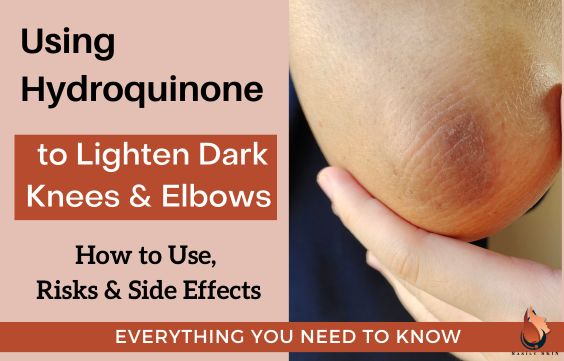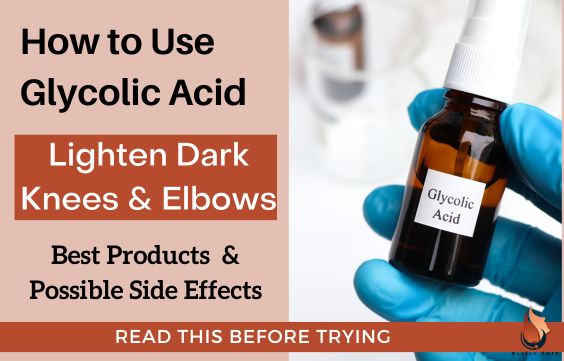How to Use Lemon to Lighten Dark Knees & Elbows

It’s no surprise that people use lemon for dark knees & elbows. Thanks to its lightening effects, it has been used for ages in DIY skincare for dark spots and hyperpigmentation.
So, in this article, we will talk about how to use lemon specifically for the knees & elbows and how to make some great DIY recipes.
How Lemon Works For Dark Knees & Elbows
Lemon is very rich in Vitamin C (Ascorbic Acid), Citric Acid, and Malic Acid. Together these ingredients inhibit melanin production, gently exfoliate the skin, and provide antioxidant protection.
Vitamin C is a powerful antioxidant that also inhibits tyrosinase (the enzyme involved in melanin production). So, not only does it fight free radical damage which can cause age spots and hyperpigmentation, but it also battles pigmentation from the root by inhibiting the production of melanin (skin pigment).
Citric Acid and Malic Acid both also inhibit melanin production to some extent, but they also help to gently exfoliate the skin to remove dead and old skin cells.
The combination of the three acids and their actions help to gradually lighten and tone the skin.
Related Articles:
What Causes Dark Knees & Elbows & How to Prevent
How to use Baking Soda to Lighten Dark Knees & Elbows
How Long Lemon Takes To Work
This will depend on how you use it, how darkened your skin is, and the cause of the darkness. But generally, lemon juice will take at least 1-2 weeks for you to start seeing significant changes in your skin.
Related Articles:
How to Use Retinol to Lighten Dark Knees & Elbows
How to Use Glycolic Acid to Lighten Dark Elbows & Knees
Best Scrubs & Exfoliators for Dark Knees & Elbows
Best DIY Lemon Recipes For Dark Knees & Elbows
1- Lemon Juice + Baking Soda Scrub
- Mix 1 tablespoon of lemon juice with 1 tablespoon of baking soda
- Adjust the quantities (add more baking soda or lemon juice) as needed until the mixture is a paste.
- Apply the paste over clean skin and massage gently in circular motions for about 5 minutes.
- Let it sit for 15-20 minutes and then wash it off.
- Dry your skin and apply a moisturizer of your choice.
- Repeat 2-3 times per week.
Related Article – 7 Best DIY Remedies For Dark Knees & Elbows
2- Lemon Juice + Coconut Oil
- Mix 1 teaspoon of lemon juice with 2-3 teaspoons of coconut oil.
- Make sure it is well combined.
- Then massage the mixture into your skin and let it sit for 10-15 minutes.
- Wash it off and moisturize your skin again with more coconut oil (plain) or a moisturizer of your choice.
- Repeat 1-2 times daily
3- Lemon Juice + Aloe Vera
- Mix 4 tablespoons of aloe vera gel (freshly scooped from the plant or store-bought) and a few drops of lemon juice.
- Apply the mixture to the area of skin that is affected (in this case, your inner thighs).
- Let it rest for 10 minutes before rinsing it off.
- Towel dry and apply your best moisturizer.
- Repeat 1-2 times daily.
Side Effects Of Using Lemon For Dark Knees & Elbows
Like all skincare ingredients and treatments, lemon juice can also have side effects, especially for sensitive skin.
The main side effect associated with using lemon on your skin is irritation.
Because lemon is so acidic, it not only affects the pH of your skin but can also make it dry. This can cause irritation, especially if you already have dry and/or sensitive skin.
If you experience irritation, you can easily manage this by alternating the days on which you use the treatment, diluting the lemon juice, or using less. You can also manage irritation by making sure to moisturize your skin properly after applying the treatment.
If none of these things helps, then you may need to consider alternatives.
Related Articles:
9 Best Medical Ways to Lighten Dark Knees & Elbows
5 Best Creams to Lighten Dark Knees & Elbows
A Guide to Using Hydroquinone for Dark Knees & Elbows
Getting a Chemical Peel to Lighten Dark Knees & Elbows
Disclaimer
These recipes are personal favorites based on reviews from tons of other uses. While they are effective, they will work differently for everyone based on your skin type, skin condition, causes and daily habits.
As always, I recommend that you patch-test your skin first and use every treatment with caution.
Sources
The effect of Vitamin C on melanin pigmentation – A systematic review – PMC






